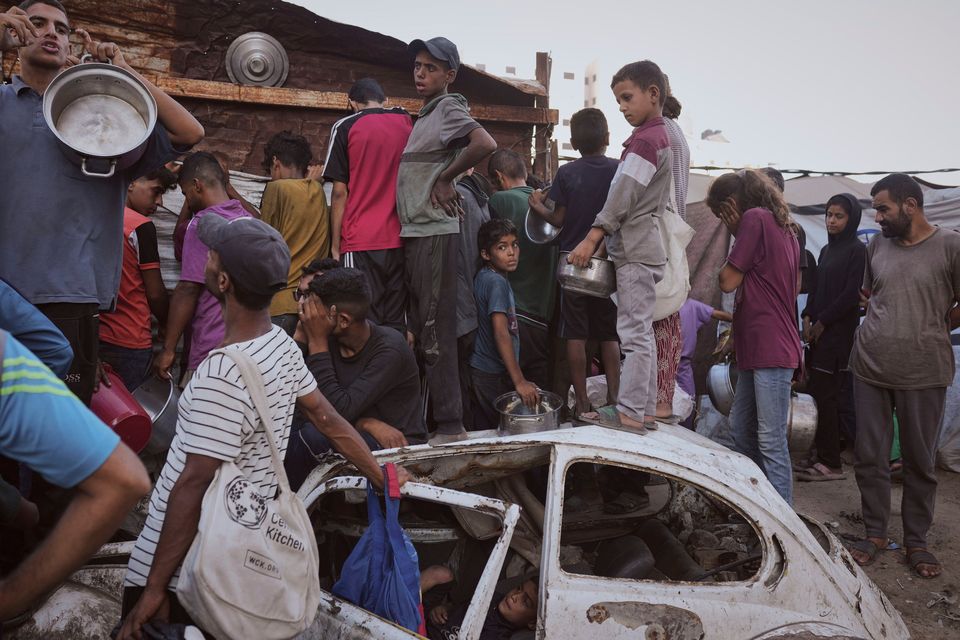World
Former Israeli PM Warns Gaza Relocation Plan Risks Ethnic Cleansing

Former Israeli Prime Minister Ehud Olmert has voiced serious concerns regarding a proposed plan to relocate the civilian population of Gaza to what has been described as a “humanitarian city.” He suggested that this initiative could be seen as a form of ethnic cleansing. The plan, announced by Israel Katz, the Israeli Defence Minister, aims to transfer approximately 600,000 Palestinians to a designated area in Rafah, located in southern Gaza.
Olmert’s comments came as humanitarian conditions in the region continue to deteriorate. On July 14, 2025, reports indicated that civilians in Gaza City were reliant on donated food supplies, highlighting the ongoing crisis. The former Prime Minister’s remarks reflect a growing unease among some Israeli leaders and international observers about the implications of such a population transfer.
The proposed relocation plan has sparked significant debate. Critics argue that moving the civilian population in such a manner could fundamentally alter the demographic landscape of the region. Olmert emphasized that any action perceived as forcibly displacing civilians could have severe repercussions, both ethically and politically.
In the backdrop of these statements, the humanitarian situation in Gaza remains dire. Aid organizations have reported that the region is facing critical shortages of food, water, and medical supplies. Hospitals are struggling to operate due to a lack of fuel and resources, placing countless lives at risk. The recent surge in violence has further complicated efforts to provide assistance to those in need.
The Israeli government has defended its military actions in Gaza, citing security concerns. However, these operations have resulted in significant civilian casualties, raising alarms among human rights advocates. As of now, the death toll in Gaza has reportedly exceeded 58,000, with children among the most affected.
As the situation unfolds, the international community is closely monitoring statements and actions from Israeli officials. The potential for further escalation remains high, and discussions about humanitarian access and civilian protection are more urgent than ever. In light of Olmert’s comments, it is clear that the complexities surrounding Gaza’s future will continue to be a focal point of both national and international discourse.
-

 Top Stories5 months ago
Top Stories5 months agoTributes Surge for 9-Year-Old Leon Briody After Cancer Battle
-

 Entertainment6 months ago
Entertainment6 months agoAimee Osbourne Joins Family for Emotional Tribute to Ozzy
-

 Politics6 months ago
Politics6 months agoDanny Healy-Rae Considers Complaint After Altercation with Garda
-

 Top Stories6 months ago
Top Stories6 months agoIreland Enjoys Summer Heat as Hurricane Erin Approaches Atlantic
-

 World7 months ago
World7 months agoHawaii Commemorates 80 Years Since Hiroshima Bombing with Ceremony
-

 Top Stories5 months ago
Top Stories5 months agoNewcastle West Woman Patricia Foley Found Safe After Urgent Search
-

 Top Stories7 months ago
Top Stories7 months agoFianna Fáil TDs Urgently Consider Maire Geoghegan-Quinn for Presidency
-

 World7 months ago
World7 months agoCouple Convicted of Murdering Two-Year-Old Grandson in Wales
-

 World7 months ago
World7 months agoGaza Aid Distribution Tragedy: 20 Killed Amid Ongoing Violence
-

 Top Stories6 months ago
Top Stories6 months agoClimbing Errigal: A Must-Do Summer Adventure in Donegal
-

 Top Stories6 months ago
Top Stories6 months agoHike Donegal’s Errigal Mountain NOW for Unforgettable Summer Views
-

 World7 months ago
World7 months agoAristocrat Constance Marten and Partner Convicted of Infant Murder









